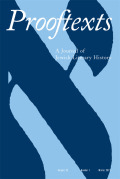
PROOFTEXTS-A JOURNAL OF JEWISH LITERARY HISTORY
Scope & Guideline
Celebrating the Legacy and Future of Jewish Literature
Introduction
Aims and Scopes
- Exploration of Jewish Literary Traditions:
The journal publishes research that delves into the rich tapestry of Jewish literary history, examining canonical texts alongside lesser-known works across various genres. - Interdisciplinary Approaches:
PROOFTEXTS encourages methodologies that draw from literary studies, history, cultural studies, and religious studies to provide a comprehensive understanding of Jewish literature. - Cultural and Historical Contextualization:
Papers often contextualize Jewish literary works within broader historical and cultural movements, exploring how these contexts influence themes, styles, and interpretations. - Thematic Diversity:
The journal covers a wide array of themes, including identity, memory, trauma, and intertextuality, reflecting the complexities of Jewish experiences and narratives. - Focus on Contemporary Issues:
PROOFTEXTS also addresses contemporary Jewish literature and its responses to modern issues, ensuring the journal remains relevant to current scholarly discussions.
Trending and Emerging
- Interdisciplinary Connections:
An increasing number of articles are making connections between Jewish literature and other fields such as performance studies, visual arts, and media, showcasing a trend towards interdisciplinary scholarship. - Memory and Trauma Studies:
Papers exploring memory and trauma, particularly in the context of the Holocaust and its aftermath, are gaining prominence, highlighting the importance of these themes in contemporary Jewish narratives. - Feminist and Gender Studies:
There is a notable increase in scholarship that examines gender dynamics within Jewish literary contexts, particularly through feminist frameworks, reflecting broader societal discussions on gender. - Postcolonial Perspectives:
Emerging analyses of Jewish literature through postcolonial lenses indicate a growing interest in the intersections of Jewish identity with colonial and postcolonial narratives. - Global Jewish Literature:
The exploration of Jewish literature in global contexts, including Indian Jewish literature and Mizrahi narratives, marks a significant trend towards inclusivity and diversity in Jewish literary studies.
Declining or Waning
- Traditional Historical Narratives:
There is a noticeable reduction in papers focusing solely on historical narratives of Jewish literature without contemporary relevance, indicating a shift towards more dynamic interpretations. - Classical Text Interpretation:
The emphasis on classical texts and their interpretations has waned, possibly as researchers pivot towards exploring contemporary Jewish literature and its complexities. - Centralized National Identity Themes:
Themes centered around a singular national identity or narrative have decreased, suggesting a move towards more pluralistic and diverse representations of Jewish identity. - Static Literary Criticism:
There is less focus on static or traditional forms of literary criticism, with emerging methodologies favoring more fluid and interdisciplinary approaches.
Similar Journals
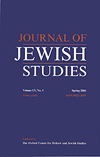
JOURNAL OF JEWISH STUDIES
Cultivating Knowledge in Jewish Literature and ReligionJOURNAL OF JEWISH STUDIES, published by the Oxford Centre for Hebrew and Jewish Studies, stands as a distinguished platform for scholarly discourse in the fields of Jewish history, culture, literature, and religious studies. With its ISSN 0022-2097, this journal is recognized for its significant contributions to understanding Jewish heritage and thought, achieving commendable rankings in various categories, including Q1 in Literature and Literary Theory and Q2 in History and Cultural Studies, as of 2023. The journal fosters rigorous academic engagement and encourages researchers and scholars worldwide to explore the complexities of Jewish identity and its interconnections with broader historical narratives. Operating without an open access model, it nonetheless ensures a wide reach through its well-regarded reputation, making it an essential resource for anyone invested in Jewish studies. With a publication history spanning from 2002 to 2024, the journal continues to serve as an invaluable repository of knowledge and insight for students, researchers, and professionals alike.

Journal for the Study of Judaism
Connecting Past and Present in Jewish StudiesJournal for the Study of Judaism, published by BRILL, serves as a vital platform for scholarly discourse in the fields of History, Literature and Literary Theory, and Religious Studies. With a commendable impact factor and ranking in the Q2 and Q3 quartiles across its respective categories, this journal facilitates high-quality research that explores the multi-faceted dimensions of Jewish studies from its inception in 1970 to the present day. For those who engage with the journal, the commitment to rigorous peer-review processes ensures publication of significant articles that advance knowledge and foster discussions within the academic community. As an essential resource for researchers, professionals, and students alike, the journal continues to enrich the understanding of Judaism through esteemed contributions of scholarship and critical analysis. The journal’s rich legacy and commitment to excellence make it an indispensable tool for those seeking to deepen their insight into Jewish studies and its broader implications.
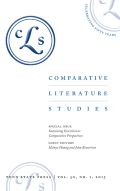
COMPARATIVE LITERATURE STUDIES
Advancing Global Literary ConversationsComparative Literature Studies is a distinguished journal published by Penn State University Press, focusing on the diverse and evolving field of comparative literature. With an ISSN of 0010-4132 and an E-ISSN of 1528-4212, this quarterly journal has been a critical platform for scholarly dialogue and interdisciplinary research since its inception in 2000. The journal proudly ranks in the Q3 category for Cultural Studies and Q2 for Literature and Literary Theory (2023), showcasing its significant impact within these domains. Notably, it ranks #214/1106 in Literature and Literary Theory according to Scopus, placing it in the 80th percentile—highlighting its relevance and quality in the global academic landscape. Despite its traditional subscription model, the journal remains a crucial resource for researchers, professionals, and students keen on exploring the intersections of cultures, texts, and histories. By publishing cutting-edge research and critical essays, Comparative Literature Studies aims to expand the horizons of literary analysis and foster innovative scholarly exchanges.

MELUS
Challenging Norms, Shaping Futures in LiteratureMELUS (Modern English Language and Literature Studies), published by Oxford University Press Inc, is a leading academic journal dedicated to exploring the complexities and dynamics of American literature and culture from various critical perspectives. With a strong historical foundation since its inception in 1974, MELUS is recognized for its contributions to both Cultural Studies and Literature and Literary Theory, achieving notable rankings in the Q2 and Q3 quartiles respectively as of 2023. The journal's articles are essential for scholars and practitioners seeking to engage with contemporary literary discourse, featuring innovative research that challenges conventional understandings of cultural identity and representation. Although it does not offer Open Access options, MELUS remains a crucial resource for academic libraries and research institutions in the United States and beyond, providing access to cutting-edge scholarship that informs the study of literature in a global context. For those invested in the field, MELUS serves as an invaluable platform for disseminating transformative ideas and fostering discussions that shape the future of literary studies.

European Journal of Jewish Studies
Advancing Interdisciplinary Dialogue in Jewish StudiesEuropean Journal of Jewish Studies is a distinguished academic publication that offers a comprehensive platform for scholarly inquiry into Jewish studies, addressing critical intersections with cultural studies, history, literature, and religious studies. Published by BRILL, a leading academic publisher based in the Netherlands, this journal boasts a robust reputation supported by its impressive rankings and quartile classifications—Q3 in Cultural Studies, Q3 in History, Q2 in Literature and Literary Theory, and Q3 in Religious Studies as of 2023. With its convergence years spanning from 2007 to 2024, the journal serves as a vital repository of research that navigates the complexities of Jewish identity and culture through interdisciplinary lenses. Although it does not operate under an open access model, the journal's rigorous peer-review process ensures the publication of high-quality research essential for students, professionals, and academics alike. Engaging with this journal opens up pathways for critical dialogue and innovative contributions to the field, making it an essential resource for those invested in the rich tapestry of Jewish studies.

JOURNAL OF JEWISH THOUGHT & PHILOSOPHY
Cultivating Insightful Perspectives on Jewish PhilosophyThe JOURNAL OF JEWISH THOUGHT & PHILOSOPHY, published by BRILL, stands as a significant academic resource since its inception in 1993. With the ISSN 1053-699X, this interdisciplinary journal uniquely bridges various fields including Literature and Literary Theory, Philosophy, and Religious Studies, providing a platform for rigorous exploration of Jewish intellectual traditions and their broader cultural implications. Holding esteemed rankings across multiple categories, including Q1 in Literature and Literary Theory and Q2 in Philosophy, the journal appeals to researchers and scholars worldwide. The journal is not open access but is available through numerous academic libraries, making it accessible to those dedicated to advancing knowledge in Jewish thought. By fostering critical discourse and innovative scholarship, it remains an essential resource for understanding complex intersections of faith, ethics, and society from a Jewish perspective.
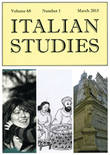
Italian Studies
Bridging Past and Present in Italian Literary DiscourseItalian Studies, published by Routledge Journals, Taylor & Francis Ltd, stands as a distinguished academic platform in the fields of Cultural Studies, History, Linguistics, Language, Literature, and the Visual Arts. Established in 1937, this journal has fostered scholarly dialogue and innovation through its robust contributions and in-depth analyses that bridge historical and contemporary perspectives on Italian culture. With an impressive ranking in Q2 and Q3 quartiles across multiple categories, including Literature and Literary Theory, and a current impact factor reflecting its growing influence, Italian Studies serves as an essential resource for researchers, professionals, and students alike. Although not an open-access journal, it remains accessible via institutional subscriptions, ensuring that a wide audience can engage with its critically acclaimed research and articles. Located in the UK, Italian Studies continues to advance the understanding of Italy's rich cultural heritage, making it a vital cornerstone for those invested in the humanities and social sciences.

Italianistica-Rivista di letteratura Italiana
Navigating the Landscape of Italian Literary ScholarshipItalianistica-Rivista di letteratura Italiana is a distinguished academic journal dedicated to the exploration and analysis of Italian literature, published by FABRIZIO SERRA EDITORE. With its ISSN 0391-3368 and E-ISSN 1724-1677, the journal serves as a pivotal platform for scholars and researchers interested in literary theory and the richness of Italian literary heritage. Operating out of Pisa, Italy, it has been a significant contributor to the field since its inception in 2002, with publication converging through to 2023. Although classified in the Q4 category in Literature and Literary Theory for 2023, the journal occupies a unique position in fostering academic dialogue and advancing scholarly research amidst a competitive landscape, as evidenced by its Scopus rank of #784 out of 1106 in the same category. The journal does not currently offer open access options, making it a focused resource for those affiliated with institutions that facilitate access to subscription-based research. Researchers and students alike will find Italianistica invaluable for its rigorous scholarship and commitment to the nuanced study of Italian literature.
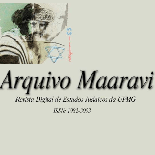
Arquivo Maaravi-Revista Digital de Estudos Judaicos da UFMG
A Platform for Critical Jewish DiscourseArquivo Maaravi-Revista Digital de Estudos Judaicos da UFMG is a distinguished open-access journal dedicated to the field of Jewish Studies, published by the Universidade Federal de Minas Gerais (UFMG). With an ISSN of 1982-3053, the journal has been serving the academic community since 2007, facilitating the dissemination of research and scholarship in Jewish cultural, historical, and religious studies. Situated in the vibrant academic landscape of Brazil, the journal aims to foster dialogue among researchers, professionals, and students, providing a platform for innovative and critical perspectives. Although the H-Index and specific Scopus ranks are not available, the journal's commitment to academic rigor and open access ensures that its content reaches a broad audience, empowering researchers and enriching the field of Jewish studies worldwide. The journal is based at FAC Ciências Econômicas, Av. Antonio Carlos, 6627, Belo Horizonte MG 31270-901, Brazil, making it an integral part of the UFMG's academic ecosystem.

Zutot
Unveiling New Insights in Religious and Cultural StudiesZutot is a distinguished academic journal published by BRILL, focusing on the multifaceted realms of Arts and Humanities, Cultural Studies, and Religious Studies. With ISSN 1571-7283 and E-ISSN 1875-0214, Zutot presents an invaluable platform for scholars seeking to explore innovative ideas and interdisciplinary approaches within these fields. Recognized within the Q4 category for its contributions to contemporary discourse, the journal ranks at the 44th percentile in Religious Studies and the 39th percentile in General Arts and Humanities, underscoring its relevance and the quality of research it publishes. Since its inception, Zutot has continued to facilitate critical dialogue and scholarship, thus acting as a crucial resource for researchers, professionals, and students alike. Its converged publication years from 2001 to 2004 and 2008 to 2024 further demonstrate its ongoing commitment to supporting rigorous academic inquiry.